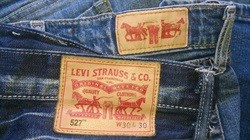
Top stories






More news


Marketing & Media
Ads are coming to AI. Does that really have to be such a bad thing?














In an interview, meant to coincide with a visit by the company's CEO and president, Charles Bergh, at a time when the company is commemorating the 20th anniversary since the opening of Levi Strauss's first and only factory in SA, in Epping, Cape Town, in 1994, Huisamen said Africans were more brand conscious than Americans.
"Levi's is one of those expressions of status. [The black middle class] will be a key part of our growth. Their shopping behaviours are different and branded companies will have to communicate differently through their marketing campaigns," he said.
Levi Strauss's Epping plant makes 35% of the company's products sold in the country as well as 40% of what is sold in other African countries. However, the fabrics are all imported.
Apart from SA, Levi Strauss began investing in sub-Saharan African countries in 2008, and today has operations in Nigeria, Angola, Mozambique, Botswana, Ghana, Tanzania and Kenya.
"The GDP (gross domestic product) is growing in many African countries and we see a very aspirational market coming through in the black middle class," said Bergh. Levi Strauss has seen 5% growth in SA over the past year despite what he called a "tough" economic climate.
Levi Strauss Asia Pacific regional president Roy Bagattini said: "Most African countries offer very good growth prospects and excellent market demographics."
However, the proliferation of counterfeit clothing is recognized as a problem for Levi Strauss. It removes more counterfeit product from circulation annually than the 2-million original products it sells.
Huisamen also cited corruption, an unstable labour market and high import duties on apparel among the challenges to global firms interested in investing in SA.
Bergh, who is due to visit the Epping plant this week, said 30% of sales in SA go through the company's own outlets, while licensed distributors such as Edgars account for 70% of sales.
Source: Business Day

For more than two decades, I-Net Bridge has been one of South Africa’s preferred electronic providers of innovative solutions, data of the highest calibre, reliable platforms and excellent supporting systems. Our products include workstations, web applications and data feeds packaged with in-depth news and powerful analytical tools empowering clients to make meaningful decisions.
We pride ourselves on our wide variety of in-house skills, encompassing multiple platforms and applications. These skills enable us to not only function as a first class facility, but also design, implement and support all our client needs at a level that confirms I-Net Bridge a leader in its field.
Go to: http://www.inet.co.za